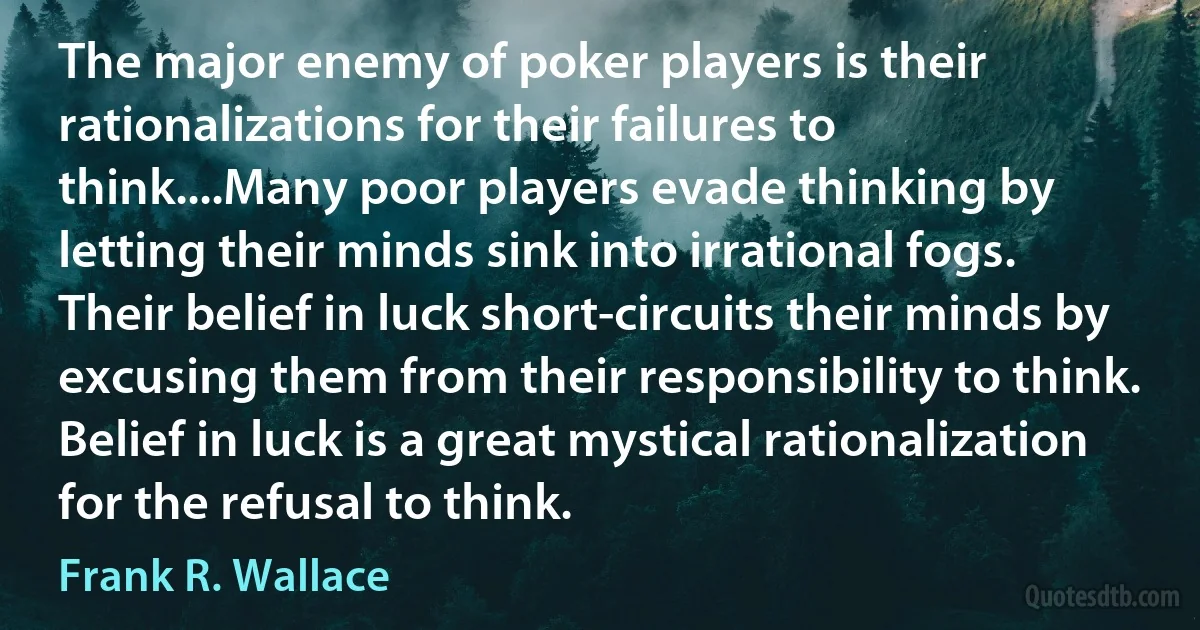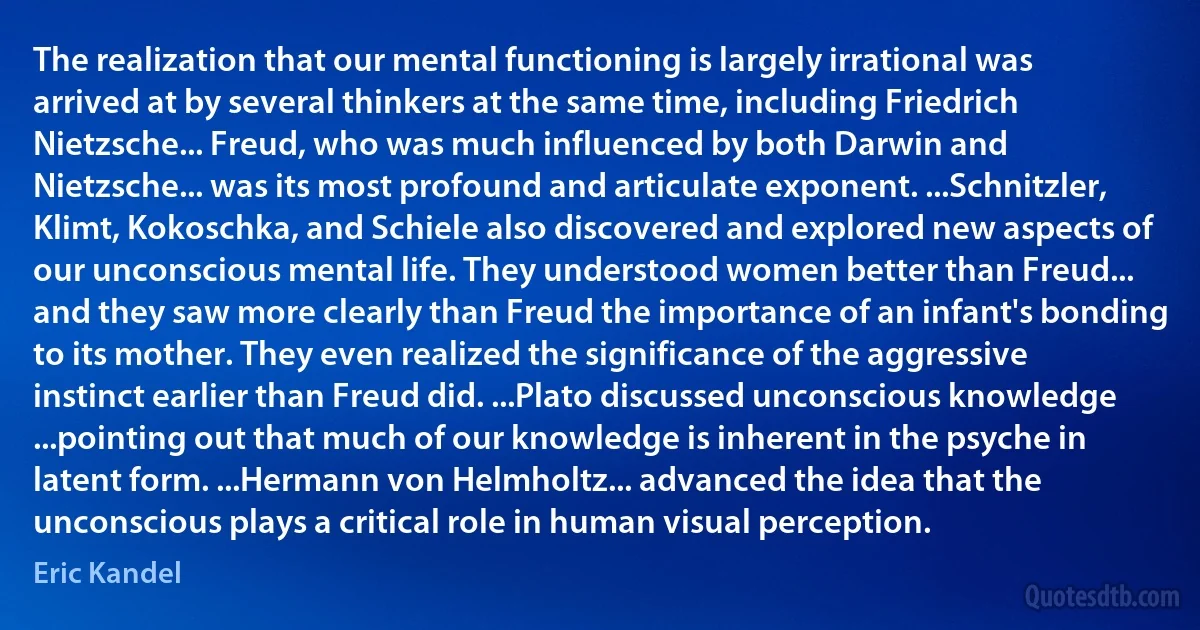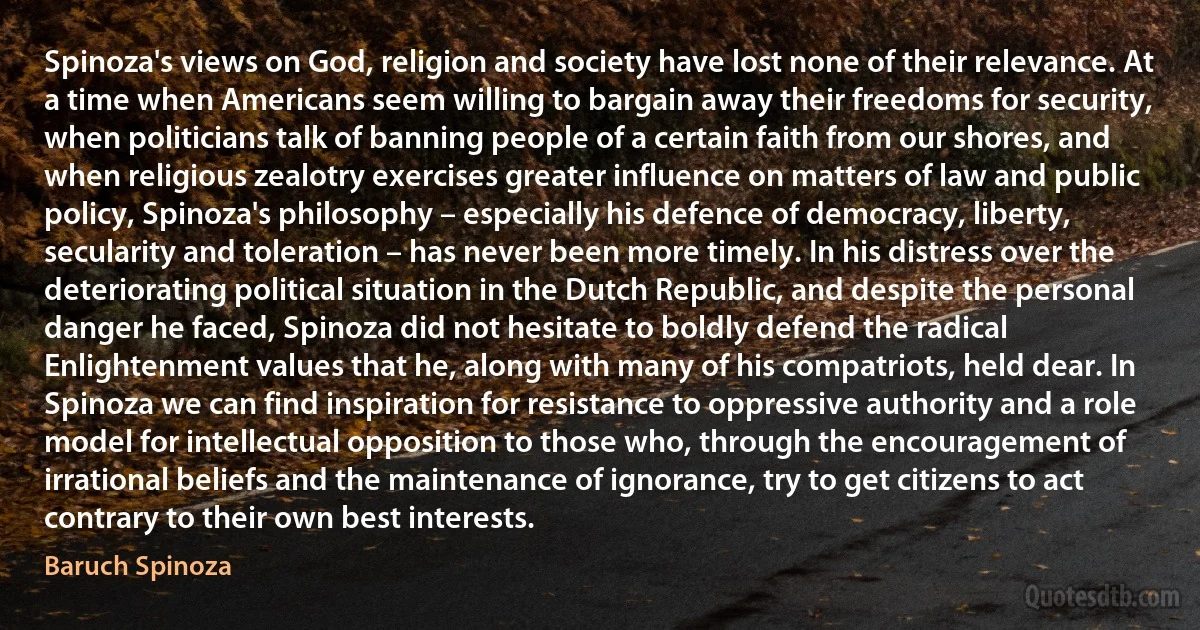Irrational Quotes - page 13
A law on press and information must be drafted, widely discussed, and adopted, with the aim not only of ending irresponsible and irrational censorship, but also of encouraging self-study in our society, fearless discussion, and the search for truth. The law must provide for the material resources of freedom of thought.
All anti-constitutional laws and decrees violating human rights must be abrogated.

Andrei Sakharov
A passion is a contranatural movement of the soul or an irrational love, or an blindfold hatred toward any material thing, or because of it: for example, for food, or for women, or for riches, or for worldly glory, or any other sensible thing; or for the sake of such things, as in a senseless hatred for someone on account of the things mentioned above.

Maximus the Confessor
O Woe to his blinded soul! Saying this, he as it were said to God: "Thou Thyself are guilty, because the woman whom Thou gavest me hast deceived me." This very same thing I myself now suffer, wretched and miserable, when I do not desire to be humbled, and to say with my whole soul that I myself am guilty of my perdition. But on the contrary I say: "That person over there inspired me to do or say this. He advised me and knocked me off the path." Woe is my poor soul which speaks such words filled with sin! O most shameless and irrational words of a shameless and irrational soul!

Symeon the New Theologian
Wherever people prefer to call upon "offenses against moral sentience", upon "moral terms" rather than adhere to one's rationally derived scientific criminological approach [dividing irrational, ethnocentric "moral offenses" from actual crimes], one is fully justified in speaking of prejudice's total victory over reason.

Gisela Bleibtreu-Ehrenberg
How skillful to tax the middle class to pay for the relief of the poor, building resentment on top of humiliation! How adroit to bus poor black youngsters into poor white neighborhoods, in a violent exchange of impoverished schools, while the schools of the rich remain untouched and the wealth of the nation, doled out carefully where children need free milk, is drained for billion-dollar aircraft carriers. How ingenious to meet the demands of blacks and women for equality by giving them small special benefits, and setting them in competition with everyone else for jobs made scarce by an irrational, wasteful system. How wise to turn the fear and anger of the majority toward a class of criminals bred - by economic inequity - faster than they can be put away, deflecting attention from the huge thefts of national resources carried out within the law by men in executive offices.

Howard Zinn
The 20th century was perhaps the deadliest in human history, devastated by innumerable conflicts, untold suffering, and unimaginable crimes.Time after time, a group or a nation inflicted extreme violence on another, often driven by irrational hatred and suspicion, or unbounded arrogance and thirst for power and resources. In response to these cataclysms, the leaders of the world came together at mid-century to unite the nations as never before.
A forum was created - the United Nations - where all nations could join forces to affirm the dignity and worth of every person, and to secure peace and development for all peoples. Here States could unite to strengthen the rule of law, recognize and address the needs of the poor, restrain man's brutality and greed, conserve the resources and beauty of nature, sustain the equal rights of men and women, and provide for the safety of future generations.

Kofi Annan
Superstitions... are nothing but persistent errors, foolish beliefs, and irrational fears. Superstitions are infinite in number and scope... It would not do to ignore them altogether, only if we should never forget the weakness and fragility of our minds. The consciousness that superstitions are rife in our own society is a healthy shock to our self-conceit and a warning. ...it lets us judge ancient superstitions with more indulgence and with a sense of humor. We could not overlook them without falsifying the general picture nor judge them too severely without hypocrisy.

George Sarton
Since Hayek was radically scornful of human reason, he could not, like John Locke or the Scholastics, elaborate a libertarian system of personal and property rights based on the insights of human reason into natural law. Nor could he, like Mises, emphasize man's rational insight into the vital importance of laissez-faire for the flourishing and even survival of the human race, or of foregoing any coercive intervention into the vast and interdependent network of the free market economy.
Instead, Hayek had to fall back on the importance of blindly obeying whatever social rules happened to have "evolved," and his only feeble argument against intervention was that the government was even more irrational and was even more ignorant, than individuals in the market economy.

Friedrich Hayek
It is not given to a cylinder to move everywhere by its own motion, nor yet to water nor to fire nor to anything else which is governed by nature or an irrational soul, for the things which check them and stand in the way are many. But intelligence and reason are able to go through everything that opposes them, and in such manner as they are formed by nature and as they choose. Place before thy eyes this facility with which the reason will be carried through all things, as fire upwards, as a stone downwards, as a cylinder down an inclined surface, and seek for nothing further. For all other obstacles either affect the body only, which is a dead thing; or, except for opinion and the yielding of reason itself, they do not crush nor do any harm of any kind; for if they did, he who felt it would immediately become bad.

Marcus Aurelius
It would appear that they believe everything, both animate and inanimate - beasts, arms, ornaments, etc.- to possess immortal attributes, subject to resurrection in the world of spirits. However, did not their motives seem so well defined by the direct allusions to their notions of futurity, we might suppose, as is frequently urged, that the burying of property, slaves, etc., with the deceased, was only intended as a mark of respect; which, indeed, is hardly more irrational than the custom of interring costly garniture and appendages with the dead among us.

Josiah Gregg
There are few with whom I can communicate so freely as with Pope. But Pope cannot bear every truth. He has a timidity which hinders the full exertion of his faculties, almost as effectually as bigotry cramps those of the general herd of mankind. But whoever is a genuine follower of truth keeps his eye steady upon his guide, indifferent whither he is led, provided that she is the leader. And, my Lord, if it may be properly considered, it were infinitely better to remain possessed by the whole legion of vulgar mistakes, than to reject some, and, at the same time, to retain a fondness for others altogether as absurd and irrational. The first has at least a consistency, that makes a man, however erroneously, uniform at least; but the latter way of proceeding is such an inconsistent chimera and jumble of philosophy and vulgar prejudice, that hardly anything more ridiculous can be conceived.

Edmund Burke
Nine-tenths of tactics are certain, and taught in books: but the irrational tenth is like the kingfisher flashing across the pool, and that is the test of generals. It can only be ensured by instinct, sharpened by thought practicing the stroke so often that at the crisis it is as natural as a reflex.

T. E. Lawrence
To suppose universal laws of nature capable of being apprehended by the mind and yet having no reason for their special forms, but standing inexplicable and irrational, is hardly a justifiable position. Uniformities are precisely the sort of facts that need to be accounted for. That a pitched coin should sometimes turn up heads and sometimes tails calls for no particular explanation; but if it shows heads every time, we wish to know how this result has been brought about. Law is par excellence the thing that wants a reason.

Charles Sanders Peirce
You sort of feel like you're a gladiator going out there because even though you know most of these people have come from a good place and they love your music and they come with a feeling of love, which is what you walk away with...It's a bit like being thrown at the lions when you go out there because you have this sort of fear, even though it's irrational, (that) you're going to get torn apart, so you go out and you have to be good.

Sade Adu
The K Foundation are interesting and lively, a good laugh and they mean it. They are very dedicated to their irrational ideas, which I am wholeheartedly in favour of. ...There is an underground again. Probably kill it stone dead to call it that. But I get the sense that there is an underground again, it's not as self-conscious as it was in the Sixties.

Alan Moore
What I may attempt is to dispel the feeling that in using the eye of the body or the eye of the soul, and incorporating what is thereby revealed in our conception of reality, we are doing something irrational and disobeying the leading of truth which as scientists we are pledged to serve.

Arthur Eddington
After a revolution that destroys all the structures of capitalism - seizes all the factories, redistributes the land, burns all the money - people who are philosophically capitalist need not be purged or intimidated with irrational authority, because lacking a military apparatus to implement capitalism or a police apparatus to protect it, they as people are quite harmless, and will either one day learn to do something creative with their lives or they'll starve to death without realizing that they can no longer pay someone to slave for them.

Peter Gelderloos
...I think my biggest frustration has been my own constant undermining of my self-belief. You have to be slightly psychopathic to become a writer: it's like any business, actually. To be successful, you have to have tunnel vision – but as this is totally irrational because you're focusing all this energy on yourself, you end up questioning your own sanity!

Roshi Fernando
My whole ambition in the pictorial domain is to materialise the images of concrete irrationality with the most imperialist fury of precision. - In order that the world of the imagination and of concrete irrationality may be as objectively evident.. ..as that of the exterior world of phenomenal reality. - The important thing is what one wishes to communicate: the concrete irrational subject. - The means of pictorial expression are placed at the service of this subject.

Salvador Dalí
Since it is always the same person whose mind thinks, wills, and judges, the autonomous nature of these activities has created great difficulties. Reason's inability to move the will, plus the fact that thinking can only "understand” what is past what neither remove it nor "rejuvenate it” ... have led to the various doctrines asserting the mind's impotence and the force of the irrational, in brief to Hume's famous dictum that "Reason is and ought only to be the slave of the passions,” that is, to a rather simple-minded reversal of the Platonic notion of reason's uncontested rulership in the household of the soul. What is so remarkable in all these theories and doctrines is their implicit monism, the claim that behind the obvious multiplicity of the world's appearances and, even more pertinently to our context, behind the obvious plurality of man's faculties and abilities, there must exist a oneness - the old hen pan, "the all is one” - either a single source or a single ruler.

Hannah Arendt



